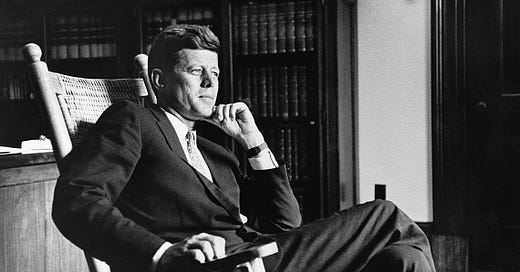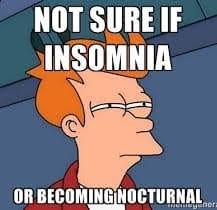Thanks to the 168 fans who signed up for the newsletter and have been enjoying the weekly content.
Don’t forget to share with friends/colleagues or anyone else you think might enjoy the content.
If you’re reading this but haven’t subscribed, now’s the time to join!
Simple as a Buddhist monk in a temple standing in some heel groove with the abbot, practicing stillness
Real Steel til' he realize his realness
Defeat Samsara, achieves nirvana and brilliance
- ‘Mural’ by Lupe Fiasco
I have always had a keen interest in US politics, even from a young age. I think some of that interest came from the fact that I was aware there had been a very famous US President whose middle name is the same as my surname.
I remember as a child always wanting to grow up to be President, as I assumed that President of Ireland was as important as the US President. (Whilst I now know that to be untrue, I haven’t given up on my dream of becoming President just yet!).
There are many stories told, and books written, about John Fitzgerald Kennedy and his time as US President. The one that comes to mind when I think about startups and life in general is around the Cuban Missile Crisis, or the Thirteen Days, as it’s also known.
On October 16th, 1962, CIA surveillance identified that Soviet nuclear missiles were being built on the island of Cuba, only 90 miles from the US, and had the range to target most major cities in the US.
It was estimated that up to 70 million Americans would die in the first round of missile strikes if the missiles were launched. This was a result of the escalation of the Cold War between the US and Russia.
Kennedy was only in the first 18 months of his presidency and it had not been going well. He had ridden to victory in the elections as a result of a message of change and carried a certain charm and persona that the public loved.
However, he lacked senior leadership experience and had already publicly failed in an attempted invasion of Cuba the previous year, which had impacted his reputation with other global leaders, particularly Russian premier Khrushchev.
Kennedy was viewed as politically weak by the Russians and they had repeatedly lied to the US about any weapons being placed in Cuba.
Separately, Kennedy also suffered from a debilitating back injury suffered during World War II and required specially designed chairs when sitting for extended periods of time.
All this presented a very difficult personal and political challenge for Kennedy during the Missile Crisis. His advisors were recommending an immediate military response on the missile sites, followed by a full-scale invasion of Cuba.
Aggression must be met with aggression, action met with action was the view.
Kennedy was hesitant, scarred from the previous Cuban invasion, but also because he felt his role as a leader was to slow down and look at the bigger picture.
His job was not to rush into the first solution that felt right, or was plausible. He needed to be strong and to resist that sort of thinking and focus on the bigger picture, because if the leader is not thinking of the bigger picture, then who is?
Kennedy took the approach of trying to understand why the Russians were taking this approach, and what advantage did they hope to achieve. It helped to put himself in the Russian’s shoes and give him an insight as to how they would respond to the different US actions.
Kennedy knew that Khrushchev thought he was weak. But he also knew that the Russians had made their move out of desperation, not out of strength.
A military strike on Cuba would lead to retaliation by the Russians on the US and likely lead to nuclear war. Inaction from the US would signify weakness and lead to further action by the Russians.
Kennedy’s initial response was to propose a blockade of Cuba with a 500 hundred-mile no-go zone around Cuba. This allowed Kennedy to use time as a tool. It gave both sides the chance to re-evaluate their position.
In Kennedy’s address to the US public on October 22nd, he set out his reason for action:
The 1930's taught us a clear lesson: aggressive conduct, if allowed to go unchecked, ultimately leads to war….
Our policy has been one of patience and restraint, as befits a peaceful and powerful nation, which leads a worldwide alliance…
We will not prematurely or unnecessarily risk the costs of worldwide nuclear war in which even the fruits of victory would be ashes in our mouth - but neither will we shrink from that risk at any time it must be faced.
In spite of criticism and pressure, both internally and externally, Kennedy remained calm throughout. He consulted with former Presidents and external experts, and allowed his team the freedom to assess, and discuss, all options without fear of reprimand.
And also, as important, was the time in solitude that Kennedy used during this period. He spent time on long walks in the grounds of the White House, and also regular swims, both of which eased his constant physical pain, and also allowed him the time to think and reflect on the situation.
In spite of constant external pressure, and provocations by the Russians of the blockade (it was officially referred to as a quarantine to appear a less aggressive response), this response allowed the Russians the time to think about their own actions.
The two countries were ‘eyeball-to-eyeball’ on the brink of nuclear war but the blockade solution bought both sides time to think.
On October 26th, Khrushchev wrote a letter to Kennedy saying that he realized that both sides were involved in a tug of war match, with war being the only outcome if both sides continued to pull against each other.
The crisis ended just as quickly as it had started.
The Russians realized their test of US resolve had failed and agreed to remove their missiles and turn back their ships that were approaching Cuba.
Kennedy had been prepared for this and the US made a pledge to never invade Cuba, and agreed to remove American missiles from Turkey. Both sides were able to publicly declare a victory.
With patience, wisdom and a keen understanding of the root of a complex problem, Kennedy had avoided a nuclear war.
Why Should You Care?
As a founder, you are constantly bombarded with outside pressures.
Your investors and board might be challenging you.
Your customers will be pressuring you to meet deadlines or roll out new features.
Your team will be challenging you for more responsibility or pushing back on your decisions.
Every problem will feel insurmountable.
Your job, as a leader, is to always look at the bigger picture.
Take time, take a walk, swim, run, do whatever works for you.
Give yourself the space to be able to think things through.
Each of your challenges will require action.
Take the time to consider the bigger picture so you can decide on the best action.
Still your mind and the answers will come.
Tell me why I’m wrong…
- Eoin
Left Field
How do I describe ‘Left Field’? It’s a place to put the content (newsletters/articles, etc) that we have amassed over recent weeks or previous years that really make us think or change our thinking on a particular topic. All the content will offer an alternative view of some topic in financial services, technology or sport (or a combination of all three!)
I have mentioned Epsilon Theory as a newsletter to follow in the past but this piece that was written last week, comparing what happened in the stock market with GameStop, etc to the Hunger Games is a truly excellent piece of writing.
I can only dream of a day when I can write at this level!
Anyway, I won’t give away too much. Enjoy the article and feel free to get in touch to discuss more!
- Eoin
Can’t Sleep?
MoneyNeverSleeps podcast episode from this week:
Episode 123: Perfect | Deborah Brock and Nua Fertility
Deborah Brock, founder and CEO of Nua Fertility, joins the show to share her story on the origins of Nua Fertility in Ireland, why it made so much sense to add in educational elements and a community ethos to the value proposition, finding global partners….and rugby as an analogy for startup life!
Book Recommendation: Highly recommend checking out ‘Stillness is the Key’ by Ryan Holiday about learning the ability to be steady, focused and calm in a constantly busy world. Have read this book multiple times!
This newsletter has been written by Eoin Fitzgerald and Pete Townsend
Want more MoneyNeverSleeps?
Check out the MoneyNeverSleeps Podcast on Apple Podcasts, Spotify and all major podcast platforms.





